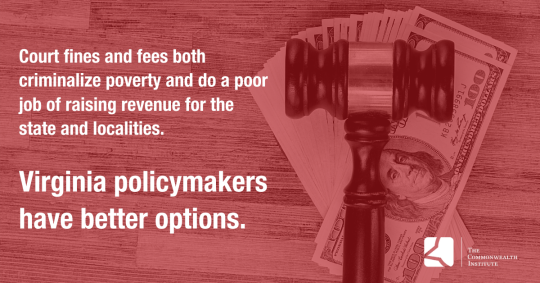May 21, 2020
Virginia Supreme Court Provides Emergency Relief from Fines & Fees: Temporary Measures Underscore the Need for Additional Reforms
We all want to build a Virginia where everyone has the opportunity to thrive. Accomplishing this goal requires thoughtful policymaking and reforming laws that can perpetuate poverty, including court fines and fees. On March 16, the Virginia Supreme Court declared a Judicial Emergency, which created new powers and flexibilities to help the courts and the public navigate the challenges of COVID-19. The Judicial Emergency Orders, currently in effect through June 7, outline a variety of measures that protect public health and provide greater economic security during the pandemic. But of the many emergency steps taken, one has been largely overlooked: the temporary relief from court fines and fees.
The significance of this step is rooted not only in the economic turmoil caused by COVID-19, but also in the lessons of the Great Recession and its aftermath. Since 2008, many states have increased fines and fees, both in the civil and criminal context, including for minor offenses, in an attempt to fill budget shortfalls. Yet fines and fees operate as a kind of regressive tax: they place the heaviest burdens on low-income families and can create poverty traps, especially when an individual’s ability to pay is not considered. Furthermore, a 2017 report by the U.S. Commission on Civil Rights concluded that municipalities relying heavily on fines and fees for revenue often have a higher than average percentage of Black and Latinx residents, indicating that these policies can disproportionately harm communities of color.
Temporary Relief From Court Fines & Fees
In Virginia, fines and fees are generally set by law and court rules. As a general matter, “fines” are intended to serve as punishment and to deter future violations, whereas “fees” primarily exist to raise revenue and can often exceed the amount of the original fine. In fiscal year 2019, court clerks collected nearly $300 million and Commonwealth’s Attorneys collected over $63 million, which flowed to the state treasury or to localities, depending on the reason that fines and fees were imposed.
Once court debt is assessed, for those who cannot pay immediately or do not set up an installment payment plan, which can result in a $10 fee, interest begins to accrue after 40 days. If no payment has been received for more than 90 days after sentencing, the account becomes “delinquent,” at which point the amount owed is increased by 17%, and collection responsibilities shift to Commonwealth’s Attorneys. A Commonwealth’s Attorney can undertake collection in-house or delegate the responsibility to a private collection agency, a local governing body, a county or city treasurer, or the Virginia Department of Taxation. What can begin as a relatively modest fine for even a low-level offense can become a significant financial burden for low-income families.
The Court’s Declaration of Judicial Emergency, which gave it the authority to “suspend, toll, extend, or otherwise grant relief from deadlines,” brought these processes to a temporary halt. The Court has prevented any interest from accruing on court debt until after June 7, when the Judicial Emergency is currently set to expire. Moreover, any accounts that would have become delinquent in March or later have not been sent to collections. Unless the Judicial Emergency is extended, however, new delinquent accounts from March through June will be referred to collections on June 30. All courts have also been encouraged to provide additional flexibility to people seeking to enter into or modify an installment payment plan, including by phone, standard mail, email, or fax. This is an important step, given that the Judicial Emergency Orders have urged people in Virginia to avoid court buildings during the pandemic.
While the Court’s quick efforts to provide relief from fines and fees are commendable, they are currently scheduled to expire soon, even as the economy continues to reel from COVID-19 and many families are suffering from unemployment or underemployment. In March, when the first Judicial Emergency Order was issued, the unemployment rate was 4.4%, yet it rose to 14.7% by April. Since mid-March, more than 680,000 people in Virginia have filed an initial claim for unemployment insurance. But early data also show the pandemic’s impact is not even: communities of color are contracting COVID-19 at higher rates and likely facing the most severe job losses. In these circumstances, as many families are struggling to afford the most essential needs — including rent, food, and health care — court debt should not take priority.

Next Steps
Now, Virginia’s policymakers can work to advance reforms that end the poverty traps created by current fines and fees structures, respond to the immediate challenges of COVID-19, and build on the lessons from the Great Recession.
- Extend Emergency Relief: Given current economic conditions, the case for providing emergency relief from court debt is even stronger now than it was in mid-March, when the Judicial Emergency was first declared. For that same reason, the U.S. House of Representatives recently passed the Health and Economic Recovery Omnibus Emergency Solutions Act” (“HEROES”) Act, which would make federal funding available for states that suspend imposition and collection of court fines and fees. The ultimate fate of that legislation is still pending, but even in the absence of new federal action, the Virginia Supreme Court has the legal authority to extend the Judicial Emergency for the “full extent” of the public health threat. At a minimum, the Court should extend the emergency relief until the special session of the General Assembly, when policymakers will reassess Virginia’s budget in light of COVID-19.
- Avoid Using Fines and Fees to Address Budget Gaps: While many states and localities increased fines and fees in an effort to address budget shortfalls during the Great Recession, Virginia should avoid this approach in response to COVID-19. Of the many choices that policymakers will have to increase revenues, fines and fees are notably inefficient, as court debt is expensive to collect, and some debt is simply uncollectible. According to one study, jurisdictions in Texas and New Mexico spent more than $0.41 for every one dollar collected. In fiscal year 2019 — an economically prosperous time — Virginia’s court clerks collected only 63% of all total court debt that was imposed. This relatively low collection rate has long been the norm. State lawmakers should instead create more sustainable ways to increase revenue, from modernizing our tax code to making sure corporations pay their fair share.
- Enact Structural Reforms: Longer term, policymakers should seize the opportunity to advance reforms that build a more efficient, sustainable, and equitable justice system. Certain fines and fees that are doing more harm than good should be repealed. This may include, for example, court debt generated in the juvenile justice system and certain counterproductive fees — like the $10 fee for installment payment plans, which are important for Virginians who cannot afford to pay debt upfront. Lawmakers should also strengthen laws requiring the courts to assess an individual’s ability to pay court debt, including before fines and fees are imposed, and granting judges more authority to waive or reduce amounts owed by people in Virginia with low income. To inform future policy decisions, courts should collect and publicly report demographic data pertaining to the assessment of fines and fees, including by race and ethnicity.
In the 2020 legislative session, the General Assembly demonstrated that it could enact reforms in this policy area that are bold and bipartisan, including repealing the harmful policy of suspending driver’s licenses for unpaid court fines and fees. State and local leaders should build on that momentum, not only in response to the economic hardships caused by COVID-19, but also to build a better justice system for all Virginians.
Category:
Decriminalizing Poverty
